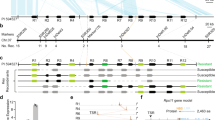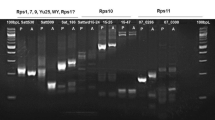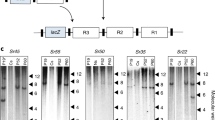Abstract
The Rp1 locus of maize determines resistance to the fungal rust pathogen Puccinia sorghi. In an attempt to isolate insertion mutations at Rp1 with the Mutator transposable element system, we found that Rp1 inactivation was common both in lines with Mutator activity and in controls lacking any known transposable element activity. Some alleles of Rp1 are endogenously inactivated as frequently as one in five-hundred, whereas other alleles are over twenty times more stable. In a standard background, no mutations of the Rp1F allele were detected in 7,339 progeny screened. In a Mutator background, 27 Rp1F inactivations were isolated from 35,356 tested seedlings. Although most Rp1F mutant seedlings lost resistance to all of the P. sorghi isolates tested, several retained resistance to a subset of rust biotypes. Some of the resistance specificity profiles obtained in these mutants are unlike any previously identified Rp1 alleles. These data indicate that the Rp1 locus is composed of multiple resistance factors with variable intrinsic stabilities.
This is a preview of subscription content, access via your institution
Access options
Subscribe to this journal
Receive 51 print issues and online access
$199.00 per year
only $3.90 per issue
Buy this article
- Purchase on Springer Link
- Instant access to full article PDF
Prices may be subject to local taxes which are calculated during checkout
Similar content being viewed by others
References
Day, P. R. Genetics of Host-Parasite Interaction (Freeman, San Francisco, 1974).
Sidhu, G. S. Sci. Prog. 62, 467–485 (1975).
Flor, H. H. Adv. Genet. 8, 29–54 (1956).
Ellingboe, A. H. in Physiological Plant Pathology, Encyclopedia of Plant Physiology, Vol. 4 (eds Heitefuss, R. & Williams, P. H.) 761–778 (Springer, New York and Heidelberg, 1972).
Robertson, D. S. Mutat. Res. 51, 21–28 (1978).
Robertson, D. S. & Mascia, P. N. Mutat. Res. 84, 283–289 (1981).
Bennetzen, J. L., Swanson, J., Taylor, W. C. & Freeling, M. Proc. natn. Acad. Sci. U.S.A. 81, 4125–4128 (1984).
Rhoades, V. H. Proc. natn. Acad. Sci. U.S.A. 21, 243–246 (1935).
Wilkinson, D. R. & Hooker, A. L. Phytopathology 58, 605–608 (1968).
Saxena, K. M. S. & Hooker, A. L. Proc. natn. Acad. Sci. U.S.A. 61, 1300–1305 (1968).
Pryor, A. J. Maize Genet. Coop. Newsl. 61, 37–38 (1987).
Bennetzen, J. L. Molec. cell. Biol. 35, 343–353 (1985).
Sturtevant, A. H. Genetics 10, 117–147 (1925).
Author information
Authors and Affiliations
Rights and permissions
About this article
Cite this article
Bennetzen, J., Qin, MM., Ingels, S. et al. Allele-specific and Mutator-associated instability at the Rpl disease-resistance locus of maize. Nature 332, 369–370 (1988). https://doi.org/10.1038/332369a0
Received:
Accepted:
Issue Date:
DOI: https://doi.org/10.1038/332369a0
This article is cited by
-
Chromosome-level genome assembly of a regenerable maize inbred line A188
Genome Biology (2021)
-
Fine mapping of the Pc locus of Sorghum bicolor, a gene controlling the reaction to a fungal pathogen and its host-selective toxin
Theoretical and Applied Genetics (2007)
-
Identification of genetically linked RGAs by BAC screening in maize and implications for gene cloning, mapping and MAS
Theoretical and Applied Genetics (2003)
-
Molecular analysis of irradiation-induced and spontaneous deletion mutants at a disease resistance locus inLactuca sativa
Molecular and General Genetics MGG (1996)
-
The Rp3 disease resistance gene of maize: mapping and characterization of introgressed alleles
Theoretical and Applied Genetics (1995)
Comments
By submitting a comment you agree to abide by our Terms and Community Guidelines. If you find something abusive or that does not comply with our terms or guidelines please flag it as inappropriate.



